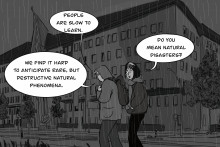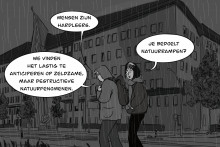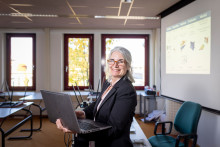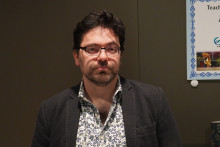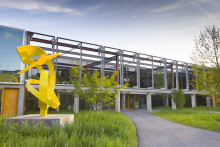Maarten van Aalst is seldom short of conversation topics, over a pint. His research concerns a subject that often leads to heated discussions: climate and disasters. How can we assess the risks of humanitarian disasters caused by climate change and what can we do to make ourselves more resilient to the consequences?
When it comes to anticipating disasters, man is proving to be quite hard-learned, says the professor. 'Every day we take the weather into account. If rain is forecast, we take an umbrella or put on a rain coat. But we take relatively little account of extreme weather conditions that are rarer. We think: it will be my time before it happens. It was only after the flood of 1953 that flood defences became a priority and we invested heavily in the Delta Works.'
Van Aalst does not like to talk about 'natural disasters', because while they may be the result of a natural phenomenon, they are actually often caused by human action - or inaction. In 2017, storm Harvey caused enormous devastation in Houston. And indeed, says Van Aalst, climate change makes the likelihood of extreme rainfall like that three times greater. 'But the city has also expanded enormously, with a lot of asphalt and concrete, so that the rainwater could not drain away. The Americans could have done a lot to make the flooding less severe.'

There are plenty of misconceptions about his field. 'It won't be too bad, the government will solve it, we'll find a technical solution,' Van Aalst summarises. 'We will raise the sea dikes and then discover that it is the rivers that could flood. Then we make room for the rivers and in the summer it turns out that we have to retain water better because of the drought. Our thinking is far too linear.'
As a rich country, we think we have our affairs in order. But that does not mean that everything is fine, continues the professor. 'The Netherlands is very much interconnected with the rest of the world. When there were floods in Thailand, the electronics factories closed down. This caused problems with the production of mobile phones in other places in the world. And when crops fail in Australia and Russia, prices rise here and famine follows in some African countries.'
Yet, despite the increase in extreme weather conditions, there are fewer victims today than in the 1970s. 'At that time, a cyclone in Bangladesh caused hundreds of thousands of deaths. Last year, millions of people were evacuated in advance of the cyclone, resulting in only 120 deaths.'
Anticipation, taking action in time, is therefore vital. As director of the Red Cross Red Crescent Climate Centre and member of the IPCC climate panel, he tries to bring such knowledge to policy and practice. His advice does not always fall on fertile ground, he says. 'The Summary for Policy Makers of each IPCC report is endorsed by governments and thus negotiated sentence by sentence. Some countries put the brakes on, for instance, because they would rather not see the human influence emphasised so strongly. As a scientist, you have to stand very firm to bring this uncomfortable truth to the fore. I think that is my role as a scientist.'
He doesn't shy away from lively discussions. However, it is sometimes difficult to find the middle ground between scientific nuance and the power of persuasion. 'Of course I want to do justice to science, but if I give a scientifically correct half-page speech and the listener doesn't get it, it's completely pointless. I find it more important that what the other person remembers is correct.'



